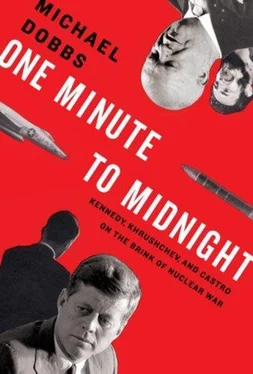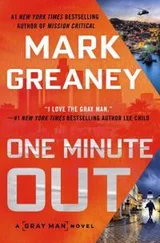B-59 was carrying several extra passengers, in addition to its regular seventy-eight-man crew. The passengers included the chief of staff of the submarine flotilla, Commander Vasily Arkhipov. Arkhipov and Savitsky were equal in rank, although Savitsky was captain of the ship and therefore ultimately responsible for it. A team of signals intelligence experts was also on board, charged with intercepting and analyzing American naval messages. To eavesdrop on the Americans, the submarine had to be close enough to the surface for its antenna to poke through the waves. Communications were interrupted whenever the sub went deep.
The sub was several hundred feet down when loud explosions began popping off all around. All compartments were dimly lit. Savitsky had switched to emergency lighting to conserve his dwindling batteries. Men were groping around in the semidarkness. As the explosions got closer, they became more nerve-wracking. Soon they were going off right next to the hull. Crew members felt as if they were seated “inside a metal barrel that someone is constantly blasting with a sledgehammer.” Nobody knew what was going on.
Savitsky was in the control room, along with Arkhipov and the chief of the signals intelligence team, Vadim Orlov. He knew nothing about the signaling procedures introduced by the U.S. Navy. He had lost communications with Moscow and the other three Foxtrots. He knew only that he was surrounded by American warships and desperately needed to recharge his batteries. He could only guess at the fate awaiting him and his men. Judging by the deafening explosions, the Americans were doing their best to torment him. There was no greater humiliation for a submarine captain than to be forced to the surface by the enemy.
Four decades later, Orlov would recall what happened next:
The Americans hit us with something stronger than a grenade, apparently some kind of practice depth charge. We thought “that’s it, that’s the end.” After this attack, a totally exhausted Savitsky became furious. In addition to everything else, he had been unable to establish communications with the General Staff. He summoned the officer who was in charge of the nuclear torpedo, and ordered him to make it combat ready. “Maybe the war has already started up there while we are doing somersaults down here,” shouted Valentin Grigorievich emotionally, justifying his order. “We’re going to blast them now! We will perish ourselves, but we will sink them all! We will not disgrace our Navy!”
7:30 P.M. SATURDAY, OCTOBER 27
In Washington, the president had ducked out of the Cabinet Room after more than two hours of tense, sometimes passionate debate to get his twice-daily dose of medicines. His doctors gave him an extra shot of hydrocortisone to compensate for adrenal insufficiency, in addition to the usual cocktail of steroids and antibiotics. Fifteen minutes later, he took a call from Jackie, who had taken the children off to their weekend retreat at Glen Ora in rural Virginia, away from the nuclear fallout zone around Washington.
Forging a consensus in the ExComm was becoming increasingly difficult. Everybody seemed to have their own ideas for dealing with the Soviets. Bobby and Ted Sorensen had gone to the president’s private office to try to merge the rival State Department and Adlai Stevenson drafts. Bob McNamara was working on a plan to pull the Jupiters out of Turkey unilaterally, to deprive the Soviets of an easy target in the event of American air strikes against Cuba. John McCone was drafting his own ultimatum to Khrushchev: another attack on U.S. surveillance planes and we’ll destroy all your military installations on Cuba. Paul Nitze was composing a demand that Moscow agree to begin dismantling its Cuban missile bases by 5:00 p.m. Washington time on Monday or face the consequences.
In the space of a few hours, alliances formed, fell apart, and reshaped themselves, as ExComm members agonized over various responses to Khrushchev. “There were sharp disagreements,” Bobby would later recall. “Everyone was tense; some were already near exhaustion; all were weighted down with concern and worry.” McCone joined forces with the veteran diplomat George Ball in attacking McNamara’s plan for a unilateral withdrawal of the Jupiters. “If we’re going to get the damn missiles out of Turkey anyway,” Ball argued, let’s trade them for the Soviet missiles and avoid “military action with enormous casualties and a great, grave risk of escalation.”
“And what’s left of NATO?” demanded an alarmed Bundy.
“I don’t think NATO is going to be wrecked,” Ball replied. “And if NATO isn’t any better than that, it isn’t much good to us.” Just a few hours earlier, the under secretary of state had insisted that merely talking about the Jupiters to the Turks would be an “extremely unsettling business.”
An aide whispered into Bundy’s ear. The national security adviser interrupted the debate on war and peace to address a more immediate issue.
“Do people want dinner downstairs, do they want trays, or do they want to wait?”
“Eating is the least of my worries,” snapped McNamara.
People drifted in and out of the Cabinet Room. In Kennedy’s absence, the debate went round in circles, sometimes descending into barely concealed animosity. Vice President Lyndon Johnson had kept his views to himself as long as the president was around. But he became much more animated when JFK was out of the room, hinting at policy differences. He was worried that the administration was “backing down” from the firm position outlined in the president’s speech. The American public could sense that the White House was wavering and felt “insecure.”
“People feel it. They don’t know why they feel it and how. They just…”
Bobby had wandered back into the room. He was angered by the suggestion that his brother was “backing down,” but LBJ pressed ahead, claiming that Soviet ships were “comin’ through” the blockade.
“No, the ships aren’t coming through. They all turned back…. Ninety percent of them.”
LBJ stuck to his guns. He repeated quietly that it was difficult to argue that “we are as strong as we were the day of the president’s announcement.” A few minutes later, after his nemesis had again wandered off, he startled other ExComm members by interjecting whimsically, “I think governments are old and tired and sick, don’t you think?” He wanted action—such as an immediate attack on a Soviet SAM site. The shoot-down of the U-2 had grabbed everybody’s attention much more than “all these signals that each one of us write.” Words were becoming meaningless. Khrushchev was “an expert at palaver.”
After his lengthy absence, the president returned to the Cabinet Room around seven thirty to wrap up the marathon ExComm meeting. He did not reveal what he had been doing while he was away, or who he had been consulting, but it was clear that he had begun to bypass the ExComm as a decision-making body. There were too many opinions to reconcile. Despite the objections of Bundy and others, Kennedy made clear he was still thinking about some kind of deal over Turkey. The United States could not invade Cuba to destroy the missiles it could trade away without incurring any carnage.
“If that’s part of the record, I don’t see how we’ll have a very good war,” the president said.
After initially supporting a trade, Johnson now feared that Khrushchev would merely use negotiations over Turkey to wrestle an endless series of concessions from the United States:
“It doesn’t just mean missiles. He takes his missiles out of Cuba, takes his men out of Cuba, and takes his planes out of Cuba. Why then your whole foreign policy is gone. You take everything out of Turkey. Twenty thousand men, all your technicians, and all your planes, and all your missiles. And… and crumble.”
Читать дальше












